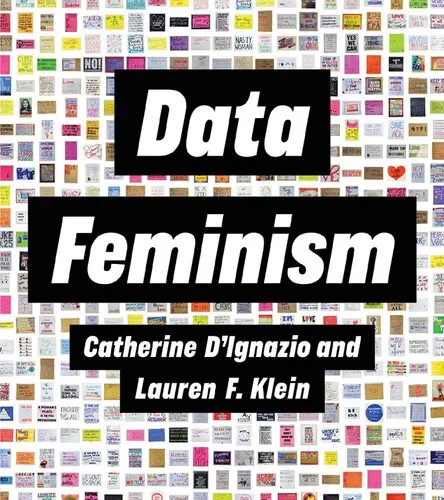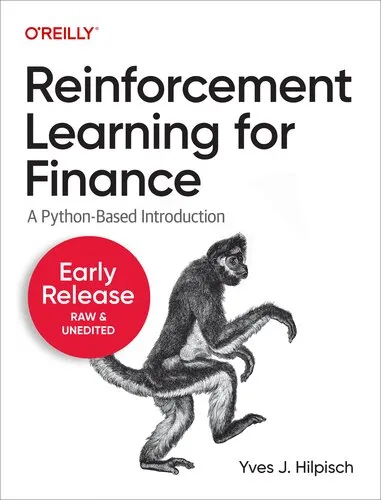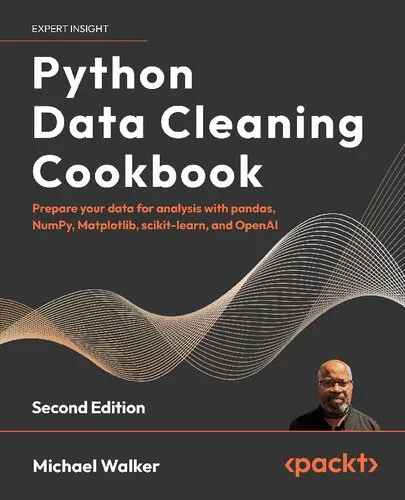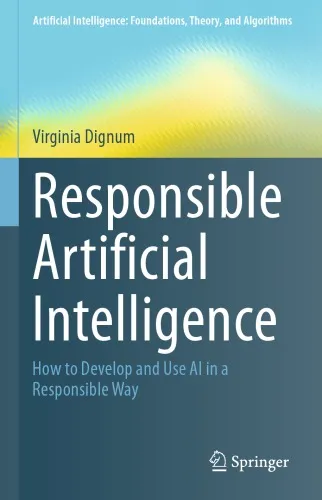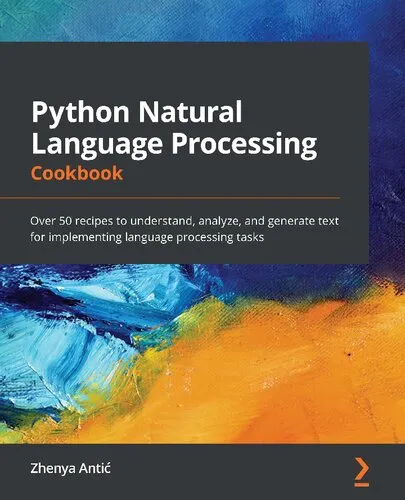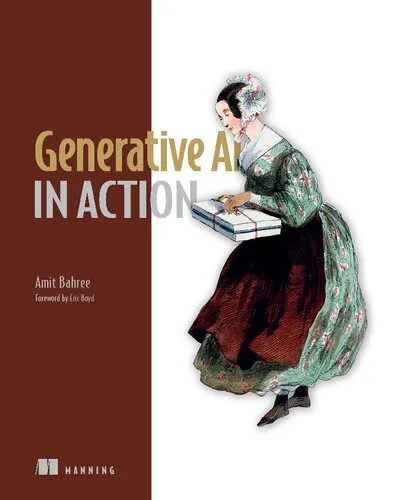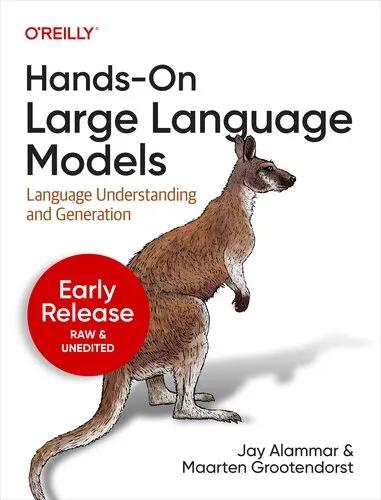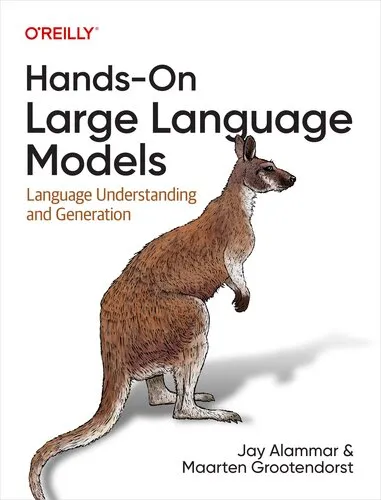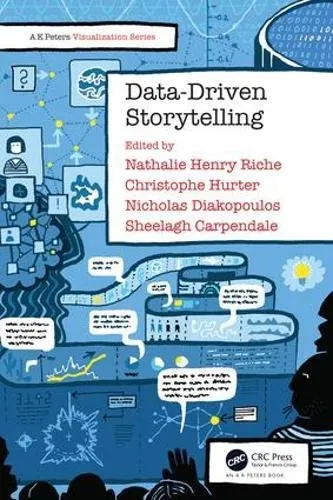Data Feminism
4.5
بر اساس نظر کاربران

شما میتونید سوالاتتون در باره کتاب رو از هوش مصنوعیش بعد از ورود بپرسید
هر دانلود یا پرسش از هوش مصنوعی 2 امتیاز لازم دارد، برای بدست آوردن امتیاز رایگان، به صفحه ی راهنمای امتیازات سر بزنید و یک سری کار ارزشمند انجام بدینکتاب های مرتبط:
معرفی کتاب «Data Feminism»
کتاب «Data Feminism» نوشته کاترین دیاگنازیو و لورن اف. کلاین، اثری مهم و تأثیرگذار است که نگاهی نوآورانه به موضوع دادهها و نقش جنسیت در تحلیل و مدیریت دادهها ارائه میدهد. این کتاب با تلفیق مفاهیم علوم داده و اصول فمینیسم، در تلاش است تا مخاطبان را به چالش کشیده و نگاهی عمیقتر به برخورداری عادلانه از قدرت دادهها بیندازد.
خلاصهای از کتاب
در «Data Feminism»، نویسندگان استدلال میکنند که علوم دادهها، همانند بسیاری از حوزههای فنی دیگر، تحت تأثیر ساختارهای قدرت نامتوازن قرار گرفته است. این کتاب به بررسی چگونگی استفاده از اصول فمینیسم میپردازد تا این عدم تقارنهای قدرت را بازشناسی کند و ابزارهایی پیشنهاد میدهد که میتوانند به ساخت سیستمهای دادهای عادلانهتر کمک کنند. دیاگنازیو و کلاین از هفت اصل اساسی فمینیسیم برای طراحی سیستمهای Data-centric استفاده میکنند که این اصول پایهای برای ایجاد تغییرات ساختاری در نحوه تجزیه و تحلیل دادهها به شمار میروند.
این اثر با برجسته کردن تجربیات و نگرانیهای مدافعان عدالت اجتماعی، داستانهایی واقعی از نحوه تأثیرگذاری دادهها در زندگی افراد ارائه میدهد و نشان میدهد که چرا ساخت و تحلیل دادهها باید توجه بیشتری به تنوع، برابری و جامعیت داشته باشد. از توسعه مدلهای Machine Learning تا طراحی Data Visualization، این کتاب مواردی عملی و مفید برای تغییر نگرش ما به دادهها ارائه میدهد.
نکات کلیدی
- ارتباط بین دانش داده و نابرابریهای اجتماعی
- اهمیت بازشناسی ساختارهای قدرت در علم داده
- بکارگیری اصول فمینیسم برای ایجاد شفافیت و عدالت در دادهها
- تمرکز بر تنوع دادهها برای افزایش دقت و جامعیت مدلهای دادهای
- تأکید بر نقش همکاری و مشارکت در ساخت سیستمهای دادهای عادلانهتر
جملات معروف از کتاب
«دادهها هرگز بیطرف نیستند؛ آنها بازتابی از ساختارهای اجتماعی و قدرت جوامع ما هستند.»
«ضروری است که علوم داده را به حوزهای تبدیل کنیم که نه تنها ابزاری برای تحلیل، بلکه ابزاری برای عدالت باشد.»
چرا این کتاب مهم است
کتاب «Data Feminism» نه تنها برای دانشمندان داده و متخصصان فناوری جذاب است، بلکه برای هر فردی که علاقهمند به عدالت اجتماعی، تنوع و شمول است نیز آموزنده خواهد بود. این اثر با ارائه نمونههای واقعی از مشکلات و نابرابریهای موجود در سیستمهای دادهای، به ما یادآوری میکند که علوم داده تنها درباره الگوریتمها و متغیرها نیست، بلکه درباره انسانهایی است که از این دادهها تأثیر میگیرند و یا به واسطه آنها تغییر میکنند.
این کتاب به ما میآموزد که دادهها میتوانند ابزاری برای ایجاد تغییرات مثبت در جهان باشند در صورتی که به شیوهای مبتنی بر اصول فمینیسم و عدالت اجتماعی با آنها برخورد شود. با فهم عمیقتر چگونگی ساخته شدن دادهها و تأثیر آنها بر تصمیمگیری، میتوانیم جامعهای عادلانهتر و شفافتر بسازیم.
Introduction to "Data Feminism"
"Data Feminism," authored by Catherine D'Ignazio and Lauren F. Klein, is a groundbreaking book that challenges conventional notions of data-driven decision-making. It intersects the fields of data science, gender studies, and social justice, providing an innovative framework for rethinking how we produce, collect, and use data in a way that prioritizes equity. The book leverages the principles of intersectional feminism to critique power structures embedded in data processes while offering actionable strategies to foster a more inclusive, ethical, and just world.
Detailed Summary of the Book
"Data Feminism" begins by unpacking the various ways data has been historically used to reinforce systemic inequalities, whether through biased algorithms, incomplete datasets, or exclusionary practices in data collection. The book takes inspiration from feminist theories, particularly the concept of "intersectionality," as conceived by scholar Kimberlé Crenshaw, to examine how multiple systems of oppression—such as race, gender, class, and ability—interact and manifest in data practices.
The authors outline seven principles of data feminism and weave them throughout real-world examples, case studies, and personal stories to demonstrate how power operates within data. These principles include examining power, challenging unequal structures, elevating the perspectives of those marginalized, and making data more transparent and accessible. By doing so, D'Ignazio and Klein make a compelling case for transforming how we think about and handle data to create more equitable outcomes.
Far from being a book solely for academic audiences or data scientists, "Data Feminism" speaks to activists, policymakers, designers, and anyone interested in the ways data can be wielded as a tool for systemic change. The authors pair their critique of existing power imbalances with actionable strategies that anyone can adopt to promote fairness and accountability in data science and analysis.
Key Takeaways
- Data is not neutral: All data is shaped by the context in which it is created, reflecting the biases and power dynamics of its creators.
- Intersectionality matters: Borrowing from intersectional feminism, the book emphasizes the importance of recognizing how data interacts with multiple systems of oppression.
- Power must be made visible: The authors urge readers to actively examine and challenge power dynamics embedded within data collection, analysis, and visualization.
- Challenge structural inequalities: The book demonstrates how existing systems of oppression can be perpetuated through biased data and algorithms.
- Actionable principles: The seven principles of data feminism serve as a guiding framework for making data science more equitable and inclusive.
Famous Quotes from the Book
"When power goes unexamined and unchallenged, inequality flourishes—and so do the tools and technologies that encode this inequality in new ways."
"The work of data feminism is to unmask how power operates and to envision new ways of being, knowing, and doing in the world."
"Counting is never a neutral act. What counts—and who counts—depends on who is doing the counting."
Why This Book Matters
In an era where data is being increasingly used to make decisions that affect people’s lives, the importance of "Data Feminism" cannot be overstated. At its core, the book is a call to action, urging readers to question the so-called objectivity of data and to recognize the social, political, and cultural forces that influence it. Through its groundbreaking approach, the book offers a much-needed critique of traditional data practices, which have often ignored or silenced marginalized voices.
Moreover, "Data Feminism" equips individuals with the tools to rethink and reshape data science for the greater good. It provides a lens through which technologists, activists, and policymakers can engage with data more critically and ethically. By emphasizing intersectionality, power dynamics, and community-centered approaches, the book transcends theoretical discussion and becomes a practical guide for meaningful change.
By bridging the gap between feminism and data science, "Data Feminism" represents a significant contribution to both fields. It pushes for a reimagination of data practices and calls for an urgent shift in how we approach the collection, analysis, and sharing of data to ensure fairness, inclusivity, and justice.
دانلود رایگان مستقیم
شما میتونید سوالاتتون در باره کتاب رو از هوش مصنوعیش بعد از ورود بپرسید
دسترسی به کتابها از طریق پلتفرمهای قانونی و کتابخانههای عمومی نه تنها از حقوق نویسندگان و ناشران حمایت میکند، بلکه به پایداری فرهنگ کتابخوانی نیز کمک میرساند. پیش از دانلود، لحظهای به بررسی این گزینهها فکر کنید.
این کتاب رو در پلتفرم های دیگه ببینید
WorldCat به شما کمک میکنه تا کتاب ها رو در کتابخانه های سراسر دنیا پیدا کنید
امتیازها، نظرات تخصصی و صحبت ها درباره کتاب را در Goodreads ببینید
کتابهای کمیاب یا دست دوم را در AbeBooks پیدا کنید و بخرید
1486
بازدید4.5
امتیاز0
نظر98%
رضایتنظرات:
4.5
بر اساس 0 نظر کاربران
Questions & Answers
Ask questions about this book or help others by answering
No questions yet. Be the first to ask!
